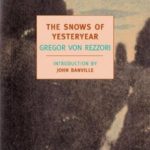by Ryan Groves
Don’t Let’s Go to the Dogs Tonight is Alexandra Fuller’s coming of age memoir set in the midst of a war-torn African nation. She recounts, in often vivid detail, the harsh realities of living in a violently polarized society and the deep scars that war leaves upon its survivors. Most importantly, her memoir captures the confusion she feels about her own identity and the inherent contradiction of being a white African.
 Alexandra “Bobo” Fuller was born in 1969 in Derbyshire, England. In 1972 her family moved from the relative comfort of the English countryside to the arid and inhospitable climate of the Rhodesian bush and into a civil war that had been raging for close to six years. While being white afforded the Fullers a certain degree of privilege, the harsh landscape and constant threat of guerilla fighters from neighboring Mozambique meant that night raids, land mines, and basic survival were a part of daily life. On several occasions, Fuller describes her childhood as one of ever present danger. She remembers helping her father, a reservist for the Rhodesian Army, load magazines before he went on patrol, convoying in armored trucks to the grocery, and the reflection of guerilla binoculars from the hills surrounding their farm. When the war ends and Rhodesia becomes Zimbabwe in 1980, the Fuller’s farm is mandatorily auctioned under the new government’s land redistribution policy. Everything that the family had toiled for eight years to build vanishes. From Zimbabwe, the Fullers move to Malawi and then Zambia, struggling to find a place in an Africa where they no longer hold a privileged status. As the world around them changes, the Fullers are forced to confront their own prejudices and personal demons.
Alexandra “Bobo” Fuller was born in 1969 in Derbyshire, England. In 1972 her family moved from the relative comfort of the English countryside to the arid and inhospitable climate of the Rhodesian bush and into a civil war that had been raging for close to six years. While being white afforded the Fullers a certain degree of privilege, the harsh landscape and constant threat of guerilla fighters from neighboring Mozambique meant that night raids, land mines, and basic survival were a part of daily life. On several occasions, Fuller describes her childhood as one of ever present danger. She remembers helping her father, a reservist for the Rhodesian Army, load magazines before he went on patrol, convoying in armored trucks to the grocery, and the reflection of guerilla binoculars from the hills surrounding their farm. When the war ends and Rhodesia becomes Zimbabwe in 1980, the Fuller’s farm is mandatorily auctioned under the new government’s land redistribution policy. Everything that the family had toiled for eight years to build vanishes. From Zimbabwe, the Fullers move to Malawi and then Zambia, struggling to find a place in an Africa where they no longer hold a privileged status. As the world around them changes, the Fullers are forced to confront their own prejudices and personal demons.
The strength of Don’t Let’s Go to the Dogs Tonight is its ability to portray many of these trials with a dark and honest humor characteristic of one who has known crippling fear and refused to let it conquer her. The foundation of the book is not its portrayal of the war, but how the Fullers are able to move forward despite the hardships and disappointments they face every day. Unfortunately, tragedy constantly befalls the family. Fuller’s dedication is not only to her parents and sister, but also to three siblings who died (a sister who drowned, a brother who died of meningitis, and another who was stillborn). These deaths and the constant uncertainty of life play heavily into the family dynamic, especially as Fuller’s mother descends deeper into alcoholism and mental illness. Fuller’s witness to her mother’s inner turmoil is at the center of the narrative and is reflected in the title, taken from a quote by H.P. Herbert. Ultimately, it is the figure of Nicola Fuller that is the key to understanding the true purpose of Don’t Let’s Go to the Dogs Tonight. Some would see the book as a lamentation for Africa. It is, in actuality, an attempt to understand where and who we come from.



